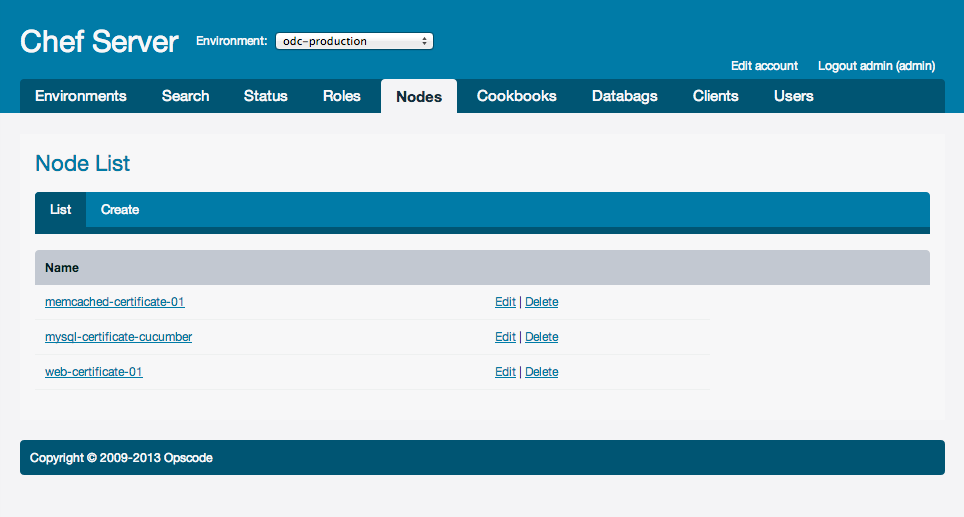Identical, Repeatable, Disposable
Test-Driven Infrastructure with Cucumber-chef
Open Data Institute Tech Team · @ukoditech
Who am I?
- Hired as DevOps Engineer at the Open Data Institute
- http://whatisdevops.com/
- It's about culture. It's not a deliverable
- I'm now Head Of Robots
Behaviour-Driven Development
- Dan North (instigator of BDD) says: "BDD is a second-generation, outside-in, pull-based, multiple-stakeholder, multiple-scale, high-automation, agile methodology. It describes a cycle of interactions with well-defined outputs, resulting in the delivery of working, tested software that matters" (Wikipedia)
Cucumber
http://cukes.info/
- Allows us to express requirements in something very close to plain English (using Gherkin)
- Executable Specification
Write a feature
Feature: Sign in to the member directory
As a member, I need to sign in to the system to modify my account details
Scenario: Successful signin
Given that I have a membership number and password
When I visit the sign in page
And I enter my membership number and password
And the password is correct
When I click sign in
Then I should have signed in successfullyWatch it fail
cucumber features/signin.feature -f progress
UUUUUU
1 scenario (1 undefined)
6 steps (6 undefined)
0m0.004s
You can implement step definitions for undefined steps with these snippets:
When(/^I enter my membership number and password$/) do
pending # express the regexp above with the code you wish you had
end
Then(/^I should have signed in successfully$/) do
pending # express the regexp above with the code you wish you had
endDefine the steps
Drive out the code required to make the tests pass
Given /^that I have a membership number and password$/ do
member = Member.create(
:email => 'sam@foobar.com',
)
member.confirm!
@membership_number = member.membership_number
@password = 'p4ssw0rd'
end
When /^I enter my membership number and password$/ do
fill_in('member_membership_number', :with => @membership_number)
end
Then /^I should have signed in successfully$/ do
page.should have_content "Signed in successfully"
endLive documentation

Cucumber extensions
Aruba
Pre-baked step definitions (and some other stuff)
Scenario: one without postcodes
When I successfully run `noodile sample.csv`
Then a file named "outputs/complete.no.postcodes.csv" should existThen /^a file named "([^"]*)" should exist$/ do |file|
check_file_presence([file], true)
enddef check_file_presence(paths, expect_presence)
prep_for_fs_check do
paths.each do |path|
if expect_presence
File.should be_file(path)
else
File.should_not be_file(path)
end
end
end
endRobot-powered Infrastructure
All watched over by machines of loving graceRichard Brautigan
Things used to suck
- Physical iron, in a datacentre, with everything hand-installed
- Crappy documentation (if you were lucky)
- Maybe some hacky bash scripts
- SNOWFLAKE!
Treat your servers as cattle, not as pets
- Identical
- Repeatable
- Disposable
Chef
- Infrastructure as code
- Describe your (desired) infrastructure with a Ruby DSL
-
Key concepts
- Nodes
- Recipes which are contained inside cookbooks
- Roles
- Environments
- Data bags
- Knife, the command-line tool which drives it all
Simple abstractions
For example, this:
package 'nginx' do
action :install
endinstalls stock nginx. Under the hood, Chef works out from the host OS whether it needs apt or yum or whatever, but we don't need to care about that
Elegant idempotency
- Wikipedia says "In computer science, the term idempotent is used... to describe an operation that will produce the same results if executed once or multiple times"
- OpsCode's resources (e.g. package) are guaranteed to be idempotent
- But we can also cast aside the safety net and dive right in...
Raw scripts
script 'Bundling the gems' do
interpreter 'bash'
cwd current_release_directory
user running_deploy_user
code <<-EOF
bundle install --without=development --quiet --path #{bundler_depot}
EOF
end- This is valid Chef
- No guarantees here - you're on your own
-
There's nothing to stop you putting
in there (DON'T DO THIS!):(){ :|:& };: - This might be a good way in if you're wanting to try out Chef
Test-driven Infrastructure
TDD allows me to demonstrate my incompetence in the tests *as well* as in the code. Awesome.Sam, on Twitter
Cucumber-chef
-
Test lab
- Chef server
- LXC test instances
- Set of cucumber step definitions
The Chef server

LXC
- Wikipedia says: "LXC (LinuX Containers) is an operating system-level virtualization method for running multiple isolated Linux systems (containers) on a single control host."
- This is how Heroku works
- Docker is also based on LXC
- Dokku, a Heroku of your own
Step definitions
Things like
And /^I run "([^\"]*)"$/ do |command|
@result = @connection.exec(command, :silence => true)
@output = @result.output
@exit_code = @result.exit_code
end
Then /^I should( not)? see "([^\"]*)" in the output$/ do |boolean, string|
if (!boolean)
@output.should =~ /#{string}/
else
@output.should_not =~ /#{string}/
end
endA cucumber-chef example
Ecosystems
The Labfile
ecosystem "odc" do
container "web-certificate-01" do
distro "ubuntu"
release "precise"
persist true
ip "192.168.98.30"
mac "00:00:5e:16:89:b5"
chef_client (
{
:environment => "odc-production",
:run_list => [
"role[certificate]"
]
}
)
end
endFeatures
Feature: webserver
Background:
* I ssh to "web-certificate-01"
Scenario: Core dependencies are installed
* package "git" should be installed
Scenario: Ruby 1.9.3 is installed
When I run "su - certificate -c 'ruby -v'"
Then I should see "1.9.3" in the output
Scenario: configuration stuff is correct
* file "current/config/database.yml" should exist
When I run "cat current/config/database.yml"
Then I should see "host: 192.168.98.20" in the outputStep definitions
Then /^package "([^\"]*)" should be installed$/ do |package|
command = ""
if (dpkg = @connection.exec("which dpkg 2> /dev/null",
silence: true).output).length > 0
command = "#{dpkg.chomp} --get-selections"
elsif (yum = @connection.exec("which yum 2> /dev/null",
silence: true).output).length > 0
command = "#{yum.chomp} -q list installed"
end
@result = @connection.exec(command, :silence => true)
@result.output.should =~ /#{package}/
endMaking it pass
Add the recipe to the role
name 'certificate'
default_attributes 'user' => 'certificate',
'group' => 'certificate',
'migration_command' => 'bundle exec rake db:migrate'
run_list "role[base]",
"recipe[chef-client::cron]name "base"
run_list "recipe[git]"And now this test passes
Librarian
- Tool for managing cookbooks
- A bit like bundler
- Driven by the Cheffile
site 'http://community.opscode.com/api/v1'
cookbook 'chef-client'
cookbook 'apt', '= 1.9.0'
cookbook 'git'
cookbook 'mongodb', :github => 'edelight/chef-mongodb'
cookbook 'mysql'
cookbook 'fail2ban', :github => 'opscode-cookbooks/fail2ban'Putting it into production
Vagrant
- Is amazing
- Started as a wrapper around VirtualBox
- Since 1.1, can drive cloud servers too
- http://www.vagrantup.com/
The Vagrantfile
Vagrant.configure("2") do |config|
config.vm.define :certificate_theodi_org_01 do |config|
config.vm.provider :rackspace do |rs|
rs.flavor = /512MB/
rs.image = /Precise/
rs.auth_url = "https://lon.identity.api.rackspacecloud.com/v2.0"
end
config.vm.provision :chef_client do |chef|
chef.environment = "odc-production"
chef.chef_server_url = "https://chef.theodi.org"
chef.run_list = [
"role[certificate]"
]
end
endContinuous deployment
- Pull-request-based development (Gitflow)
- Continuous integration (http://jenkins.theodi.org/)
- Every Chef run checks for new code and deploys
- If it's ready, it goes live
Further reading
- The Cucumber Book
- Test-Driven Infrastructure with Chef (Second Edition released last week!)
- The ODI's Chef repo
- Devops Consulting: Why I Don't - Sascha Bates' take on what DevOps is and isn't
- reveal.js, the thing driving this presentation
Questions?



